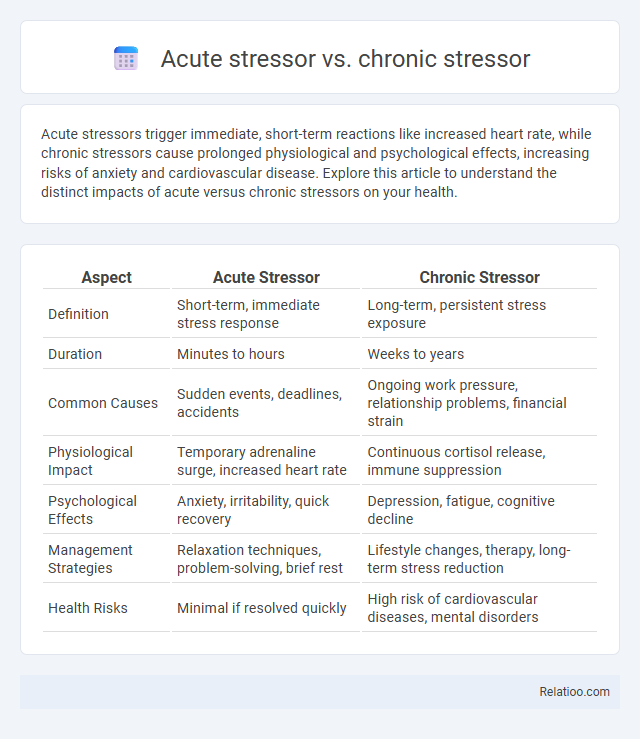Acute stressors trigger immediate, short-term reactions like increased heart rate, while chronic stressors cause prolonged physiological and psychological effects, increasing risks of anxiety and cardiovascular disease. Explore this article to understand the distinct impacts of acute versus chronic stressors on your health.
Table of Comparison
| Aspect | Acute Stressor | Chronic Stressor |
|---|---|---|
| Definition | Short-term, immediate stress response | Long-term, persistent stress exposure |
| Duration | Minutes to hours | Weeks to years |
| Common Causes | Sudden events, deadlines, accidents | Ongoing work pressure, relationship problems, financial strain |
| Physiological Impact | Temporary adrenaline surge, increased heart rate | Continuous cortisol release, immune suppression |
| Psychological Effects | Anxiety, irritability, quick recovery | Depression, fatigue, cognitive decline |
| Management Strategies | Relaxation techniques, problem-solving, brief rest | Lifestyle changes, therapy, long-term stress reduction |
| Health Risks | Minimal if resolved quickly | High risk of cardiovascular diseases, mental disorders |
Understanding Stressors: Acute vs Chronic
Understanding stressors involves differentiating between acute and chronic types, where an acute stressor triggers a short-term physiological response to immediate challenges, such as a sudden deadline or an argument. Chronic stressors persist over extended periods, causing prolonged emotional strain and potential health issues, exemplified by ongoing financial troubles or a stressful work environment. Recognizing your body's reaction to these varying stressors is crucial for managing your overall well-being and preventing long-term negative effects.
Defining Acute Stressors
Acute stressors are intense, short-term events that trigger immediate physiological and psychological responses, such as a sudden job interview or a near-accident. Unlike chronic stressors, which persist over extended periods like ongoing financial difficulties or continuous work pressure, acute stressors cause temporary but significant spikes in stress hormones. Understanding how your body reacts to acute stressors helps in managing sudden stress effectively, preventing long-term health consequences.
Characteristics of Chronic Stressors
Chronic stressors are persistent, long-term challenges that continuously tax your mental and physical resources, such as ongoing financial difficulties or a difficult work environment. Unlike acute stressors, which are short-lived and specific events, chronic stressors often lack a clear endpoint and can lead to sustained physiological arousal, increasing the risk of health problems like hypertension and depression. Understanding the distinct characteristics of chronic stressors helps in developing effective coping strategies to mitigate their impact on your well-being.
Common Examples of Acute Stressors
Acute stressors are short-term events that trigger a sudden stress response, such as an important exam, a car accident, or a job interview. Chronic stressors persist over an extended period, including ongoing financial problems or caregiving responsibilities, while general stressors encompass any factors causing psychological or physiological strain. Common examples of acute stressors include narrowly avoiding a traffic collision, receiving unexpected bad news, or facing a tight work deadline.
Frequent Sources of Chronic Stress
Frequent sources of chronic stress include financial difficulties, ongoing work pressure, relationship conflicts, and persistent health problems, which continuously tax your mental and physical health. Unlike acute stressors that trigger short-term responses, chronic stressors produce long-lasting impacts by maintaining elevated cortisol levels and prolonged anxiety. Understanding these persistent stress factors is crucial for managing overall well-being and preventing chronic stress-related illnesses.
Psychological Impact of Acute Stress
Acute stressors trigger a rapid, intense psychological response characterized by heightened alertness and anxiety, often resolving quickly once the event passes. Chronic stressors impose prolonged psychological strain, leading to sustained feelings of fatigue, depression, or anxiety that can impair mental health over time. Your ability to manage acute stress effectively can reduce the likelihood of it developing into chronic psychological harm.
Long-Term Effects of Chronic Stress
Acute stressors trigger immediate, short-term responses that typically resolve quickly, while chronic stressors persist over extended periods, leading to sustained activation of the body's stress system. Chronic stress causes significant long-term effects such as weakened immune function, increased risk of cardiovascular disease, and impaired cognitive abilities due to prolonged cortisol exposure. Understanding your exposure to different types of stressors helps in developing strategies to mitigate chronic stress and protect your overall health.
Coping Strategies for Acute Stressors
Acute stressors are sudden, short-term events that trigger immediate physiological and emotional responses, while chronic stressors persist over an extended period, leading to sustained strain on the body and mind. You can manage acute stressors effectively through coping strategies such as deep breathing exercises, mindfulness meditation, and time-limited problem-solving techniques that help reduce immediate anxiety and prevent escalation. Understanding the differences between these stressors allows for tailored coping mechanisms that enhance resilience and overall well-being.
Management Techniques for Chronic Stressors
Chronic stressors, unlike acute stressors which are short-term and immediate, persist over extended periods and require sustained management techniques for effective mitigation. Effective management techniques for chronic stressors include developing long-term coping strategies such as cognitive-behavioral therapy (CBT), consistent physical exercise, mindfulness meditation, and establishing strong social support networks. Stressor identification and personalized stress management plans are critical to reducing the physiological and psychological impacts of chronic stress.
When to Seek Professional Help for Stress
Recognizing the differences between acute stressors, which are short-term and situational, and chronic stressors, which persist over an extended period, is crucial for managing your mental health effectively. Persistent exposure to chronic stressors can lead to debilitating symptoms such as anxiety, depression, or physical health issues, indicating a need for professional intervention. You should seek professional help if stress impairs your daily functioning, causes overwhelming emotional reactions, or if coping strategies fail to provide relief.

Infographic: Acute stressor vs Chronic stressor
 relatioo.com
relatioo.com